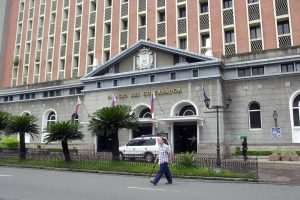ERC approves higher rate for FIT-All

By Sheldeen Joy Talavera, Reporter
CONSUMERS will face higher electricity bills starting in March as the Energy Regulatory Commission (ERC) approved a new rate for the feed-in tariff allowance (FIT-All).
In a statement late on Saturday, the ERC said it has approved the rate of P0.1189 per kilowatt-hour (kWh), higher than the current rate of P0.0838 per kWh collected from on-grid consumers.
However, this new rate is lower than the P0.1220 per kWh sought by the National Transmission Corp. (TransCo).
The ERC said the collection of the adjusted FIT-All will start for the March billing period.
The FIT-All is a uniform charge billed to all on-grid electricity consumers to support the development and promotion of renewable energy.
Payments are remitted to the FIT-All fund established and administered by TransCo. The fund goes towards paying eligible RE developers who have obtained fixed rates for electricity generated by their projects.
As the administrator, TransCo is tasked to file the application before the ERC to determine the annual FIT-All rate.
In approving the increase, the ERC noted the depletion of the FIT-All Fund due to sustained low prices in the Wholesale Electricity Spot Market (WESM), the trading floor of electricity.
“The lower-than-expected WESM prices adversely affected the fund’s capacity to cover the FIT payments, necessitating adjustments in the FIT-All computation to ensure payments for the supply to consumers coming from renewable energy (RE) FIT-eligible power plants,” the ERC said.
The FIT differential was lowered to P10.13 billion from TransCo’s forecast of P13.64 billion. This represents the difference between the FIT rates payable to RE and the WESM prices.
The ERC said it used actual generation data for January to December 2024 “to ensure a more accurate assessment.”
It also noted that the computation for the administration allowance and disbursement allowance was based on actual expenses incurred in 2024, rather than TransCo’s projected figures.
“The ERC is committed to ensuring that FIT-All rates are fair, transparent, and reflective of actual market conditions,” the commission said.
Asked for further details, ERC Chairperson and Chief Executive Officer Monalisa C. Dimalanta told BusinessWorld that the increase in FIT-All rate within the first quarter will ensure that the fund has enough to pay the eligible RE FIT suppliers.
“For Q4 (fourth quarter), the rate is effective until a new rate is issued by the Commission or until suspended, like we did in December 2022,” Ms. Dimalanta said in a Viber message.
Sought for comment, Jose M. Layug, Jr., president of the Developers of Renewable Energy for Advancement, Inc., told BusinessWorld that the adjusted FIT-All rate boosts the confidence of the RE developers and the private sector in the Philippines.
“This ERC move is consistent with the recent Supreme Court decision promulgated last Aug. 13, 2024 upholding the constitutionality of the Renewable Energy Act of 2008 and the FIT System towards encouraging development of renewable energy resources as tools to effectively prevent or reduce harmful emissions and thereby balance the goals of economic growth and protection of health and environment,” he said in a Viber message.
In January 2024, the ERC lifted the 13-month collection suspension of FIT-All due to the projected deficit in the FIT-All fund.
The ERC first suspended FIT-All collection for three months covering the billing period of December 2022 to February 2023 to ease the financial burden on consumers amid the rising cost of electricity in 2022.
The suspension of the FIT-All collection was extended twice in 2023.




